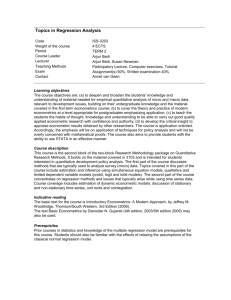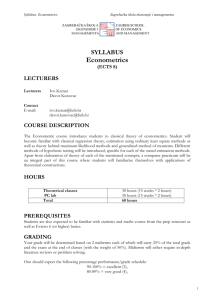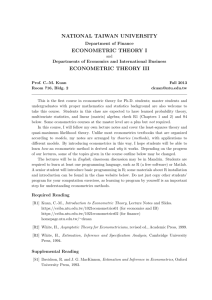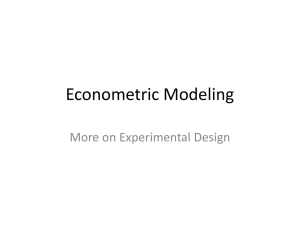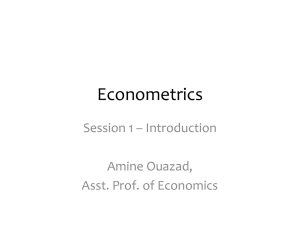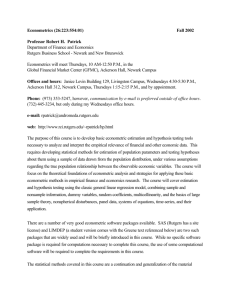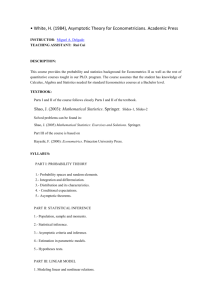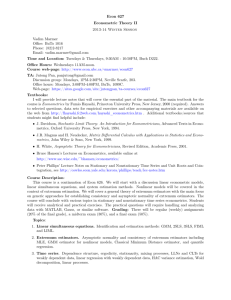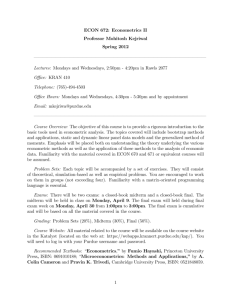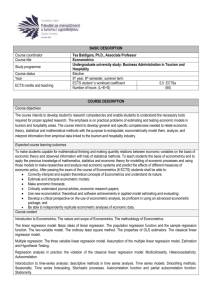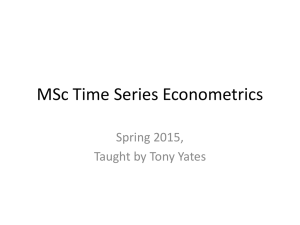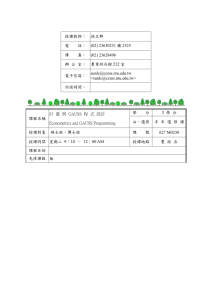econometrics i - Universidad Carlos III de Madrid
advertisement
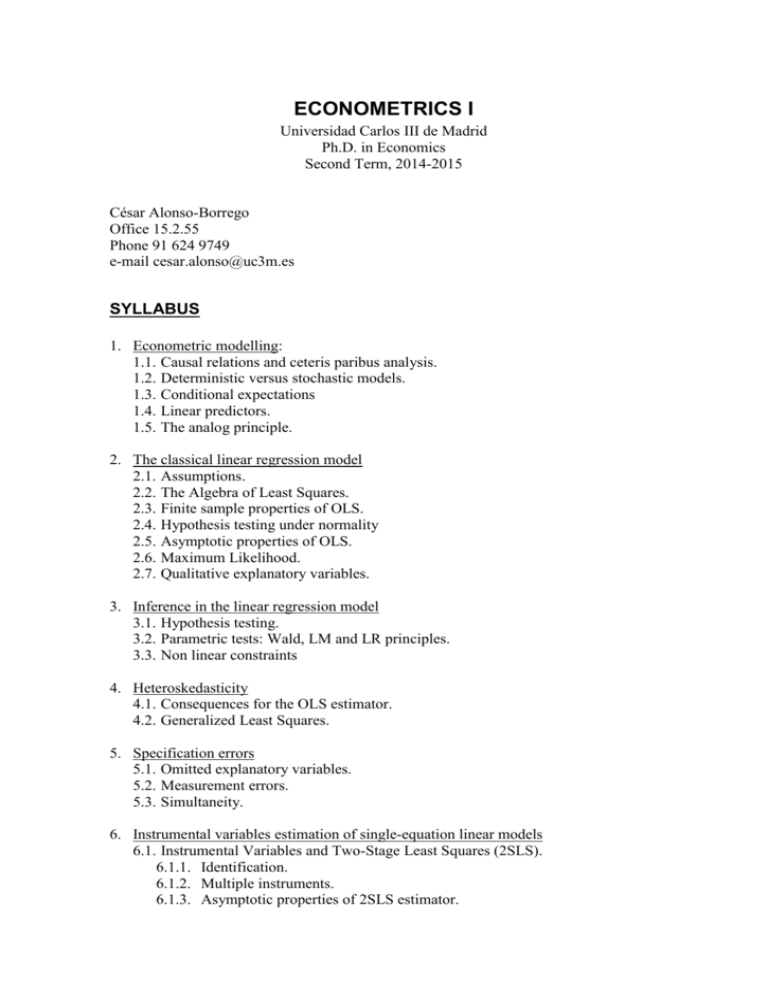
ECONOMETRICS I Universidad Carlos III de Madrid Ph.D. in Economics Second Term, 2014-2015 César Alonso-Borrego Office 15.2.55 Phone 91 624 9749 e-mail cesar.alonso@uc3m.es SYLLABUS 1. Econometric modelling: 1.1. Causal relations and ceteris paribus analysis. 1.2. Deterministic versus stochastic models. 1.3. Conditional expectations 1.4. Linear predictors. 1.5. The analog principle. 2. The classical linear regression model 2.1. Assumptions. 2.2. The Algebra of Least Squares. 2.3. Finite sample properties of OLS. 2.4. Hypothesis testing under normality 2.5. Asymptotic properties of OLS. 2.6. Maximum Likelihood. 2.7. Qualitative explanatory variables. 3. Inference in the linear regression model 3.1. Hypothesis testing. 3.2. Parametric tests: Wald, LM and LR principles. 3.3. Non linear constraints 4. Heteroskedasticity 4.1. Consequences for the OLS estimator. 4.2. Generalized Least Squares. 5. Specification errors 5.1. Omitted explanatory variables. 5.2. Measurement errors. 5.3. Simultaneity. 6. Instrumental variables estimation of single-equation linear models 6.1. Instrumental Variables and Two-Stage Least Squares (2SLS). 6.1.1. Identification. 6.1.2. Multiple instruments. 6.1.3. Asymptotic properties of 2SLS estimator. 6.2. Generalized Method of Moments. 6.2.1. Introduction. 6.2.2. Asymptotic properties. 6.3. Specification tests 6.3.1. Testing over-identifying restrictions. 6.3.2. Testing for endogeneity. 7. Introduction to panel data 7.1. Unobserved heterogeneity. 7.2. Fixed effects vs. random effects. COURSE OUTLINE AND OBJECTIVES The sequence in Econometrics in the PhD Program at Universidad Carlos III de Madrid consists on three compulsory courses in the first year: Statistics, and Econometrics I and II. Econometrics I assumes that the student possesses the required background in Probability and Statistical inference provided by the Statistics course taught in the first term. In particular, it is assumed that the basic probability tools regarding properties of random variables on Euclidean spaces, transformations of random variables, conditional distributions, and stochastic convergence of random variables, are well understood. Also, a good knowledge on the basic concepts of statistical inference; i.e. sampling distributions, pointwise estimators: method of moments and maximum likelihood methods, interval estimators, asymptotic inferences and hypothesis testing, is asumed. The textbook by Mittelhammer (1995) provides a good account of what is needed. The sequence in Econometrics is intended to provide the basic background on quantitative methods to applied and theoretical researchers. The course Econometrics I is devoted to introduce the econometric methodology in the context of the linear model. Nonlinear and dynamic models will be treated in Econometrics II and in the subsequent optional courses offered during the second year. A set of problems will be handed out for each topic. These problems are very important for the preparation for the exam. Some exercises will require manipulation of real data sets with econometric software. Selected problems will be solved in class. The textbooks for this course are Wooldridge (2002), Hayashi (2000) and Ruud (2000). As complementary textbooks, less technical, but with more applications and motivation, Wooldridge (2000) and Goldberger (1991) are recommended. SELECTED TEXTBOOKS Amemiya, T. (1985): Advanced Econometrics, Blackwell Publishers. Goldberger, A.S. (1981): A Course in Econometrics, Harvard University Press. Gorieroux, C. and Monfort, A. (1995): Statistics and Econometric Models, Cambridge University Press. Greene, W.H. (2003): Econometric Analysis, Prentice Hall. Hayashi, F. (2002): Econometrics, Princeton University Press. Ruud, P.A (2000): An Introduction to Classical Econometric Theory, Oxford University Press. Wooldridge, J.M. (2000): Introductory Econometrics: A Modern Approach, South Western College Publishing. Wooldridge, J.M. (2002): Econometric Analysis of Cross Section and Panel Data, MIT press. OTHER BOOKS THAT ARE USEFUL TO SPECIFIC TOPICS Arellano, M. (2003), Panel Data Econometrics, Oxford University Press. Härdle, W. (1990): Applied Nonparametric Regression, Cambridge University Press. Manski, C. (1988): Analog Estimation Methods in Econometrics. Chapman and Hall. Mittelhammer, R.C. (1995): Mathematical Statistics for Economics and Business, Springer. Serfling, R.J. (1980): Approximation Theorems of Mathematical Statistics, Wiley. White, H. (1994): Asymptotic Theory for Econometricians, Academic Press. White, H. (1994): Estimation, Inference and Specification Analysis, Academic Press.
